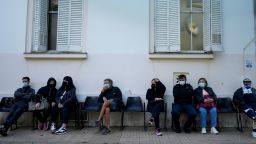Editor’s note: The views expressed in this commentary are solely those of the writer. CNN is showcasing the work of The Conversation, a collaboration between journalists and academics to provide news analysis and commentary. The content is produced solely by The Conversation.
In September 2023, several people came down with dengue fever in Paris, France. The presence of this mosquito-borne disease was notable for two reasons. It was the most northerly outbreak ever recorded, and none of the people had travelled recently. This demonstrated it is now possible for dengue to be transmitted locally in northern Europe.
These facts are important in 2024 because of the Olympics. France waits in anticipation of more than 10 million athletes, spectators, officials and tourists descending on the city for the event. The French government knows there is a risk of dengue. In Paris, hundreds of sites are being regularly checked for the presence of the dengue-carrying mosquitoes. Will this be enough?
The concept of the super-spreader in infection epidemiology is not new. In essence, it means that a small fraction of a population, maybe just one person, is responsible for most of the cases. A famous historical super-spreader was “typhoid Mary”. Mary Mallon was an asymptomatic carrier of typhoid who may have infected over 100 people.
READ MORE: Dengue: Brazilian single-dose vaccine could help turn tide in the fight against fever
A study published in the journal Nature suggests that about 15% of people were responsible for 85% of cases of COVID in Hunan Province, China. In terms of dengue, one analysis from Peru of super-spreading suggests 8% of human-occupied spaces are responsible for over half of cases. (It should be noted that dengue cannot be caught directly from another human, only from the bite of a dengue-carrying mosquito.)
This is not the first time the Olympics has been identified as a risk factor for viral epidemics. The 2016 Olympics in Brazil were almost postponed because of fears about Zika - another virus transmitted by the Aedes mosquito.
In the end, any worries were put to bed, because there were no reported cases.
Fear about COVID spreading via the Tokyo Olympics brought about drastic measures to limit transmission. At that event, few infections occurred inside the Olympic bubble, but there was an increase in cases among the general population.
So what is different about Paris?
Aedes has spread considerably further than in 2016, and the number of dengue cases worldwide has increased dramatically in the same period. In 2016 there were 5.2 million cases reported worldwide. Halfway through 2024, there have already been 7.6 million cases.
READ MORE: Viruses can change your scent to make you more attractive to mosquitoes, new research in mice finds
Visitors from more than 200 countries are expected in France for the Olympics. Many of those countries are already experiencing dengue this year.
For the Paris Olympics to become a super-spreader event, several factors must overlap. There needs to be enough mosquitoes, enough susceptible and already-infected people, enough time and enough mosquito bites.
Perfectly adapted
The tiger mosquito is perfectly adapted to the urban Paris environment. It needs just the smallest amount of water in a small container to lay its eggs. It preferentially feeds on humans, at dawn and dusk. The eggs themselves can withstand dry conditions for months. Once wet again, the eggs will hatch.
READ MORE: Dengue in France: tropical diseases in Europe may not be that rare for much longer
What makes this situation potentially dangerous for Paris is that some of these mosquitoes may have dengue already inside them, passed down from their mother. This could significantly reduce the number of bites needed to start an epidemic.
Within the time frame of the Olympics, an infected athlete or spectator could be bitten once by a mosquito and seed an epidemic in a week or so. Each female mosquito can lay up to 200 eggs at a time.
Get CNN Health's weekly newsletter
- Sign up here to get The Results Are In with Dr. Sanjay Gupta every Friday from the CNN Health team.
Most dengue cases are asymptomatic. People infected before or during the Olympics may have no idea they are carrying the virus. They might take the virus back home and seed an epidemic there without ever knowing it.
Whether people get sick or not, they are carrying the virus and can transmit the infection onwards if they get bitten by an Aedes mosquito.
At the Rio Carnival this year, a dengue outbreak just days before the event led to a public health emergency being called, but the event wasn’t cancelled.
There will be no public health emergency in Paris because the event itself is the risk factor. Anyone living, working, visiting, competing, volunteering or even just passing through Paris during the Olympic period is going to be part of a huge natural experiment – whether they know it or not.
Republished under a Creative Commons license from The Conversation.





